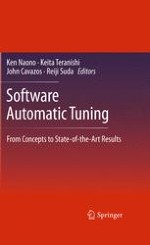2010 | OriginalPaper | Buchkapitel
7. Automatically Tuned Mixed-Precision Conjugate Gradient Solver
verfasst von : Serban Georgescu, Hiroshi Okuda
Erschienen in: Software Automatic Tuning
Verlag: Springer New York
Aktivieren Sie unsere intelligente Suche, um passende Fachinhalte oder Patente zu finden.
Wählen Sie Textabschnitte aus um mit Künstlicher Intelligenz passenden Patente zu finden. powered by
Markieren Sie Textabschnitte, um KI-gestützt weitere passende Inhalte zu finden. powered by
